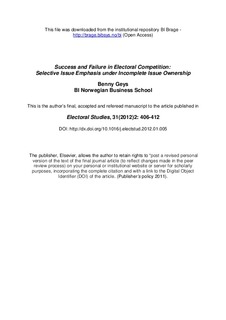| dc.contributor.author | Geys, Benny | |
| dc.date.accessioned | 2012-08-30T08:53:58Z | |
| dc.date.available | 2012-08-30T08:53:58Z | |
| dc.date.issued | 2012 | |
| dc.identifier.issn | 1873-6890 (e-utg) | |
| dc.identifier.uri | http://hdl.handle.net/11250/93626 | |
| dc.description | This is the author’s final, accepted and refereed manuscript to the article | no_NO |
| dc.description.abstract | Political parties are often argued to compete for voters by stressing issues they feel they own – a strategy known as ‘selective emphasis’. While usually seen as an electorally rewarding strategy, this article argues that cultivating ‘your’ themes in the public debate is not guaranteed to be electorally beneficial and may even become counter-productive. It describes the conditions under which ‘selective emphasis’ becomes counter-productive, and applies the argument to recent discussions regarding the strategies of mainstream parties confronting the extreme right. | no_NO |
| dc.language.iso | eng | no_NO |
| dc.publisher | Elsevier | no_NO |
| dc.subject | Issue Salience | no_NO |
| dc.subject | Issue Ownership | no_NO |
| dc.subject | Party Competition | no_NO |
| dc.title | Success and failure in electoral competition: selective issue emphasis under incomplete issue ownership | no_NO |
| dc.type | Journal article | no_NO |
| dc.type | Peer reviewed | no_NO |
| dc.source.pagenumber | 406-412 | no_NO |
| dc.source.volume | 31 | no_NO |
| dc.source.journal | Electoral Studies | no_NO |
| dc.source.issue | 2 | no_NO |
| dc.identifier.doi | 10.1016/j.electstud.2012.01.005 | |
